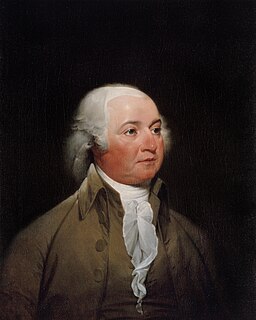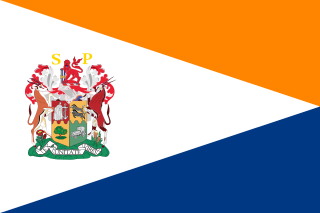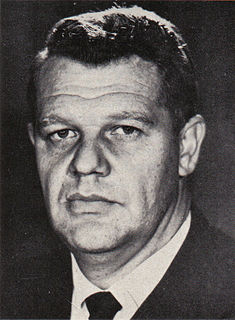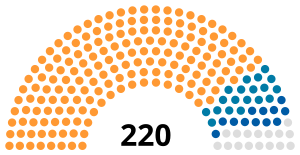
The 1796 United States presidential election was the third quadrennial presidential election. It was held from Friday, November 4 to Wednesday, December 7, 1796. It was the first contested American presidential election, the first presidential election in which political parties played a dominant role, and the only presidential election in which a president and vice president were elected from opposing tickets. Incumbent Vice President John Adams of the Federalist Party defeated former Secretary of State Thomas Jefferson of the Democratic-Republican Party.

The State President of the Republic of South Africa was the head of state of South Africa from 1961 to 1994. The office was established when the country became a republic in 1961, and Queen Elizabeth II ceased to be monarch of South Africa. The position of Governor-General of South Africa was accordingly abolished. From 1961 to 1984, the post was largely ceremonial. After constitutional reforms enacted in 1983 and taking effect in 1984, the State President became an executive post, and its holder was both head of state and head of government.

Pieter Willem Botha,, commonly known as P. W. and Afrikaans: Die Groot Krokodil, was a South African politician. He served as the last Prime Minister from 1978 to 1984 and the first executive State President from 1984 to 1989.

The National Party, also known as the Nationalist Party, was a political party in South Africa founded in 1914 and disbanded in 1997. The party was an Afrikaner ethnic nationalist party that promoted Afrikaner interests in South Africa. However in 1990 it became a South African civic nationalist party seeking to represent all South Africans. It first became the governing party of the country in 1924. It was an opposition party during World War II but it returned to power and was again in the government from 4 June 1948 until 9 May 1994.

Balthazar Johannes "B. J." Vorster was a South African politician who served as the Prime Minister of South Africa from 1966 to 1978 and as the fourth State President of South Africa from 1978 to 1979. Vorster was known for his staunch adherence to apartheid, overseeing the Rivonia Trial in which Nelson Mandela was sentenced to life imprisonment for sabotage, and the Terrorism Act, the complete abolition of non-white political representation, the Soweto Riots and the Steve Biko crisis. He conducted a more pragmatic foreign policy than his predecessors in an effort to improve relations between the white minority government and South Africa's neighbours, particularly after the break-up of the Portuguese colonial empire. Shortly after the Internal Settlement in Rhodesia, in which he was instrumental, he was implicated in the Muldergate Scandal and resigned the premiership in favour of the ceremonial state presidency, which he was forced to give up as well eight months later.

Marais Viljoen, was the last ceremonial State President of South Africa from 4 June 1979 until 3 September 1984. Viljoen became the last of the ceremonial presidents of South Africa when he was succeeded in 1984 by Prime Minister P. W. Botha, who combined the offices into an executive presidency.
The Movement for France was a conservative, soft Eurosceptic and Gaullist French political party, founded on 20 November 1994, with a marked regional stronghold in the Vendée. It was led by Philippe de Villiers, once communications minister under Jacques Chirac.

Elections in Namibia determine who holds public political offices in the country. Namibia is a semi-presidential representative democratic republic. It runs direct elections every five years for the position of the president and seats in the National Assembly, and every six years for the Regional Councils and the distribution of seats in local authorities. The National Council is elected indirectly by the constituency councillors of Namibia's 14 regions.

Connie Mulder, born Petrus Cornelius Mulder, was a South African politician, cabinet minister and father of Pieter Mulder, former leader of the Freedom Front Plus.

Texas's 22nd congressional district of the United States House of Representatives covers a largely suburban south-central portion of the Greater Houston metropolitan area. The district includes the majority of Fort Bend County, including most of the cities of Sugar Land, Missouri City, Rosenberg, Needville and the county seat of Richmond as well as the county's share of the largely unincorporated Greater Katy area west of Houston. In addition, the district also contains portions of northern Brazoria County, including Pearland and Alvin, as well as a small portion of southeast Harris County centered on Friendswood.

Sir De Villiers Graaff, 2nd Baronet, DMS, OBE known as Div Graaff, was a South African politician who succeeded his father, Sir David Pieter de Villiers Graaff, 1st Baronet, to his baronetcy in 1931. He died in 1999 and was succeeded by his son, Sir David de Villiers Graaff, 3rd Baronet. He was the leader of the centrist United Party which was the official opposition in the then all-white South African Parliament from 1956 to 1977.

General elections were held in South Africa on 22 April 1970 to elect members of the 166-seat House of Assembly. Parliament was dissolved on 2 March and the deadline for the submission of candidates was 13 March. This was the first time in South African history that the House elected was responsible entirely to white people, as the seats of the four MPs elected separately by "qualified" Cape Coloured voters expired in the same year, heralding the completion of the process of political apartheid. Similarly, it was the first election after the expulsion of Albert Hertzog and many verkrampte (hardline) representatives from the ruling National Party in 1969, who formed the new opposition Herstigte Nasionale Party in opposition, with limited success.

General elections were held in South Africa on 30 November 1977. The National Party, led by John Vorster won a landslide victory in the House of Assembly. The newly formed Progressive Federal Party, led by Colin Eglin became the official opposition. The New Republic Party, successor to the United Party, won only 10 seats, all but one of them in Natal Province. Once again, the Herstigte Nasionale Party failed to win any seats.

The Republican Party of Louisiana is the affiliate of the Republican Party in the U.S. state of Louisiana. Its chair is Louis Gurvich, who was elected in 2018.
The State Security Council (SSC) was formed in South Africa in 1972 to advise the government on the country's national policy and strategy concerning security, its implementation and determining security priorities. Its role changed through the prime ministerships of John Vorster and PW Botha, being little used during the formers and during the latter's, controlling all aspects of South African public's lives by becoming the Cabinet. During those years he would implement a Total National Strategy, Total Counter-revolutionary Strategy and finally in the mid-eighties, established the National Security Management System (NSMS). After FW de Klerk's rise to the role of State President, the Cabinet would eventually regain control of the management of the country. After the 1994 elections a committee called National Intelligence Co-ordinating Committee was formed to advise the South African president on security and intelligence as well as its implementation.
Jan Christiaan "Chris" Heunis, DMS was a South African Afrikaner lawyer, politician, member of the National Party and cabinet minister in the governments of John Vorster and P.W. Botha.

Barend Jacobus "Ben" Schoeman was a South African politician of the National Party prominent during the apartheid era. He served as the Minister of Labour from 1948 to 1954, and the Minister of Transport from 1954 until 1974.
The Democratic Party was a South African political party formed in 1973 by former Interior Minister Theo Gerdener after he broke away from the ruling National Party of South Africa. The party hoped to be a rallying point for the verligte (enlightened) Nationalists who had grown disillusioned with the hardline apartheid government of John Vorster and attracted support from younger Afrikaners. The party advocated liberalizing the country's apartheid laws to some degree and emancipating Asian and "Coloured" South Africans and had a goal of re-establishing South Africa as a confederation of ethnic groupings.

The 2019 South African general election was held on 8 May 2019 to elect a new President, National Assembly and provincial legislatures in each province. These were the sixth elections held since the end of apartheid in 1994 and determined who would become the next President of South Africa.

The South African presidential election of 1979 pitted the President of the South African Senate Marais Viljoen, backed by the ruling National Party, against the former United Party leader De Villiers Graaff, backed by the New Republic Party, and the Deputy Chancellor of the University of the Witwatersrand, Guerino Bozzoli, supported by the Progressive Federal Party. In accordance with the South African Constitution of 1961, the State President, a largely ceremonial post, was elected by a joint sitting of both houses of the South African Parliament. Both Bozzoli and Graaff had already been candidates for the presidential election of September 1978.


















